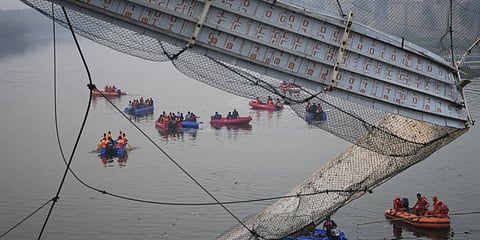

AHMEDABAD: The Gujarat government on Wednesday said it was leaving it to the discretion of the Gujarat High Court whether to grant bail to Oreva Group CMD Jaysukh Patel in the October 2022 Morbi bridge collapse case.
Justice Divyesh Joshi reserved his order after hearing submissions of the petitioner, relatives of the victims, and the government.
A suspension bridge on the Machchhu river in Morbi town of Gujarat collapsed on October 30, 2022, killing 135 persons including women and children and injuring 56.
Jaysukh Patel was made an accused in the criminal case related to the tragedy as his company maintained and operated the British-era bridge.
Additional advocate general Mitesh Amin told the court that the investigator informed the sessions court on September 18 that all aspects of the probe into the incident had been covered.
"The judgments (of the Supreme Court) have been placed by both the victim and applicant sides. A bail application cannot be decided based on a judgment, it is always the discretion of the court (hearing the plea)," he said.
Ten persons -- Oreva chairman and managing director Patel, two managers of his company, two sub-contractors who had repaired the bridge, three security guards and two ticket booking clerks employed at the twin entries to the bridge -- are the accused in the case.
Six of them were released on bail while Patel, the manager of his firm and the two proprietors of Devprakash Solutions, the firm which had carried out repairs, are still in judicial custody.
The accused are booked under Indian Penal Code sections 304 (culpable homicide not amounting to murder), 336 (act endangering human life) and 338 (causing grievous hurt by doing rash or negligent act).
While deciding the bail plea, the court may consider factors such as how long the petitioner is in jail, the completion of investigation, number of witnesses in the case, the accused being a businessman and there being no possibility of him absconding, Amin said.
"Ultimately it is the discretion of the honourable court. I leave it to the discretion of the honourable court," the additional advocate general added.
The victims have filed applications in the sessions court seeking the addition of certain offences, Amin said, and noted that as charges were yet to be framed, any side can apply for adding or removing any offence.
Patel's lawyer Nirupam Nanavaty had argued on Tuesday that a large number of people rushing on the bridge and causing it to swing also acted as contributory negligence that led to the collapse.
Even if there was some deficiency on the part of Oreva Group in the maintenance of the bridge, it had no prior knowledge of such a huge crowd gathering on that fateful evening, Nanavaty argued.
Having spent more than ten months in custody, the petitioner was not required to be incarcerated any more, he said, adding that the trial will take its own time and the court may impose any conditions while granting bail to Patel.
He also argued against the accused being charged under section 304 of the IPC.
Opposing bail for Patel, the victims' lawyer Rahul Sharma said there was a strong possibility that the witnesses' records would be tampered with, and the offence he was accused of was very serious.